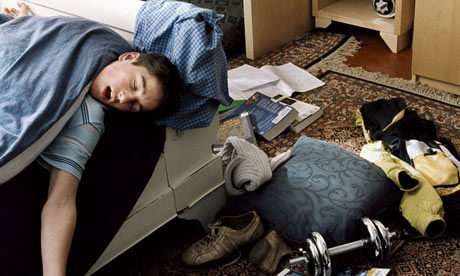 Parents have long known that the sleep-wake cycles of their adolescent offspring are rather different to those of anyone else in the household.
Parents have long known that the sleep-wake cycles of their adolescent offspring are rather different to those of anyone else in the household.
Several new and detailed studies of teenagers tell us why teens are impossible to awaken at 7 am, suddenly awake at 10 pm, and often able to sleep anywhere for stretches of 16 hours.
[div class=attrib]From the Wall Street Journal:[end-div]
Many parents know the scene: The groggy, sleep-deprived teenager stumbles through breakfast and falls asleep over afternoon homework, only to spring to life, wide-eyed and alert, at 10 p.m.—just as Mom and Dad are nodding off.
Fortunately for parents, science has gotten more sophisticated at explaining why, starting at puberty, a teen’s internal sleep-wake clock seems to go off the rails. Researchers are also connecting the dots between the resulting sleep loss and behavior long chalked up to just “being a teenager.” This includes more risk-taking, less self-control, a drop in school performance and a rise in the incidence of depression.
One 2010 study from the University of British Columbia, for example, found that sleep loss can hamper neuron growth in the brain during adolescence, a critical period for cognitive development.
Findings linking sleep loss to adolescent turbulence are “really revelatory,” says Michael Terman, a professor of clinical psychology and psychiatry at Columbia University Medical Center and co-author of “Chronotherapy,” a forthcoming book on resetting the body clock. “These are reactions to a basic change in the way teens’ physiology and behavior is organized.”
Despite such revelations, there are still no clear solutions for the teen-zombie syndrome. Should a parent try to enforce strict wake-up and bedtimes, even though they conflict with the teen’s body clock? Or try to create a workable sleep schedule around that natural cycle? Coupled with a trend toward predawn school start times and peer pressure to socialize online into the wee hours, the result can upset kids’ health, school performance—and family peace.
Jeremy Kern, 16 years old, of San Diego, gets up at 6:30 a.m. for school and tries to fall asleep by 10 p.m. But a heavy load of homework and extracurricular activities, including playing saxophone in his school marching band and in a theater orchestra, often keep him up later.
“I need 10 hours of sleep to not feel tired, and every single day I have to deal with being exhausted,” Jeremy says. He stays awake during early-afternoon classes “by sheer force of will.” And as research shows, sleep loss makes him more emotionally volatile, Jeremy says, like when he recently broke up with his girlfriend: “You are more irrational when you’re sleep deprived. Your emotions are much harder to control.”
Only 7.6% of teens get the recommended 9 to 10 hours of sleep, 23.5% get eight hours and 38.7% are seriously sleep-deprived at six or fewer hours a night, says a 2011 study by the Centers for Disease Control and Prevention.
It’s a biological 1-2-3 punch. First, the onset of puberty brings a median 1.5-hour delay in the body’s release of the sleep-inducing hormone melatonin, says Mary Carskadon, a professor of psychiatry and human behavior at the Brown University medical school and a leading sleep researcher.
Second, “sleep pressure,” or the buildup of the need to sleep as the day wears on, slows during adolescence. That is, kids don’t become sleepy as early. This sleep delay isn’t just a passing impulse: It continues to increase through adolescence, peaking at age 19.5 in girls and age 20.9 in boys, Dr. Carskadon’s research shows.
Finally, teens lose some of their sensitivity to morning light, the kind that spurs awakening and alertness. And they become more reactive to nighttime light, sparking activity later into the evening.
[div class=attrib]Read the entire article after the jump.[end-div]
[div class=attrib]Image courtesy of the Guardian / Alamy.[end-div]
